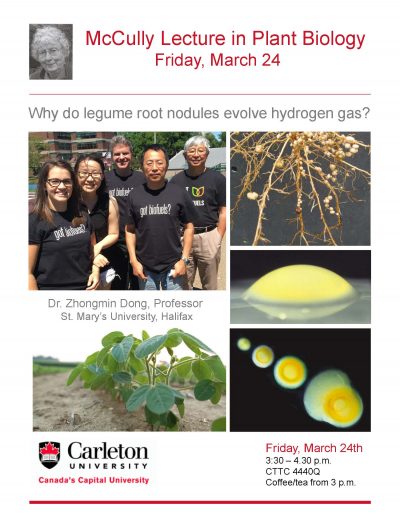Past Event! Note: this event has already taken place.
McCully Lecture: Zhongmin Dong
March 24, 2017 at 3:30 PM to 4:30 PM
| Location: | 4440Q Carleton Technology and Training Centre |
| Cost: | Free |
| Audience: | Carleton Community, Current Students, Staff and Faculty |
The Department of Biology at Carleton Universtiy has recently established an annual lecture series in Plant Biology in honour of Dr. Margaret McC
ully. This year we are delighted to present guest speaker Zhongmin Dong who will talk about a research project started at Carleton University on a bacterium isolated from sugarcane from Cuba. The study continued for over 10 years and is well-representative of a research project from field to lab, and then back to field.
Why do legume nodules evolve hydrogen gas?
with guest speaker Zhongmin Dong
Abstract: There is a well-known benefit of legume rotation in the yield of cereal grains. However, only about 20% of this rotation benefit can be attributed to legume N2 fixation and the related enhancement of soil nutrient status. Our studies suggest that a significant part of the crop rotation benefit may be coupled to changes in soil microbial populations associated with the exudations or emissions from legume roots and nodules. For example, most temperate legume nodules release to the soil large amounts of H2 (up to 7000 L H2 /ha/day) that stimulates the growth of H2-oxidizing microbes within the rhizosphere. The results indicate that the activity of soybean roots exerted significant effects on the rhizobacterial community structure causing a significant increase in soil fertility, enhancing the growth of legumes and non-legumes alike. Also, strains of H2 oxidizing microbes isolated from treated soils have plant growth promoting properties. These discoveries could help to account for the beneficial effects of legumes used in rotations and intercropping with cereals and other crops.